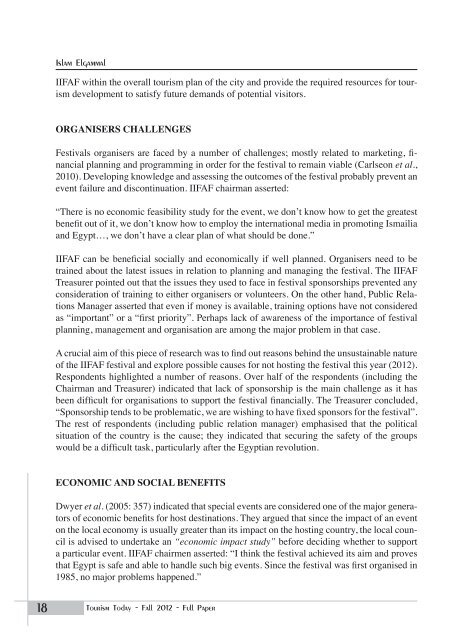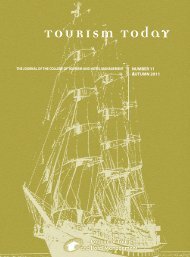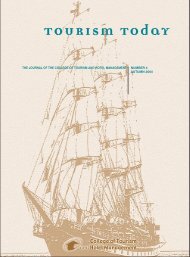Tourism Today - College of Tourism and Hotel Management
Tourism Today - College of Tourism and Hotel Management
Tourism Today - College of Tourism and Hotel Management
You also want an ePaper? Increase the reach of your titles
YUMPU automatically turns print PDFs into web optimized ePapers that Google loves.
Islam ElgammalIIFAF within the overall tourism plan <strong>of</strong> the city <strong>and</strong> provide the required resources for tourismdevelopment to satisfy future dem<strong>and</strong>s <strong>of</strong> potential visitors.ORGANISERS CHALLENGESFestivals organisers are faced by a number <strong>of</strong> challenges; mostly related to marketing, financialplanning <strong>and</strong> programming in order for the festival to remain viable (Carlseon et al.,2010). Developing knowledge <strong>and</strong> assessing the outcomes <strong>of</strong> the festival probably prevent anevent failure <strong>and</strong> discontinuation. IIFAF chairman asserted:“There is no economic feasibility study for the event, we don’t know how to get the greatestbenefit out <strong>of</strong> it, we don’t know how to employ the international media in promoting Ismailia<strong>and</strong> Egypt…, we don’t have a clear plan <strong>of</strong> what should be done.”IIFAF can be beneficial socially <strong>and</strong> economically if well planned. Organisers need to betrained about the latest issues in relation to planning <strong>and</strong> managing the festival. The IIFAFTreasurer pointed out that the issues they used to face in festival sponsorships prevented anyconsideration <strong>of</strong> training to either organisers or volunteers. On the other h<strong>and</strong>, Public RelationsManager asserted that even if money is available, training options have not consideredas “important” or a “first priority”. Perhaps lack <strong>of</strong> awareness <strong>of</strong> the importance <strong>of</strong> festivalplanning, management <strong>and</strong> organisation are among the major problem in that case.A crucial aim <strong>of</strong> this piece <strong>of</strong> research was to find out reasons behind the unsustainable nature<strong>of</strong> the IIFAF festival <strong>and</strong> explore possible causes for not hosting the festival this year (2012).Respondents highlighted a number <strong>of</strong> reasons. Over half <strong>of</strong> the respondents (including theChairman <strong>and</strong> Treasurer) indicated that lack <strong>of</strong> sponsorship is the main challenge as it hasbeen difficult for organisations to support the festival financially. The Treasurer concluded,“Sponsorship tends to be problematic, we are wishing to have fixed sponsors for the festival”.The rest <strong>of</strong> respondents (including public relation manager) emphasised that the politicalsituation <strong>of</strong> the country is the cause; they indicated that securing the safety <strong>of</strong> the groupswould be a difficult task, particularly after the Egyptian revolution.ECONOMIC AND SOCIAL BENEFITSDwyer et al. (2005: 357) indicated that special events are considered one <strong>of</strong> the major generators<strong>of</strong> economic benefits for host destinations. They argued that since the impact <strong>of</strong> an eventon the local economy is usually greater than its impact on the hosting country, the local councilis advised to undertake an “economic impact study” before deciding whether to supporta particular event. IIFAF chairmen asserted: “I think the festival achieved its aim <strong>and</strong> provesthat Egypt is safe <strong>and</strong> able to h<strong>and</strong>le such big events. Since the festival was first organised in1985, no major problems happened.”18 <strong>Tourism</strong> <strong>Today</strong> - Fall 2012 - Full Paper





